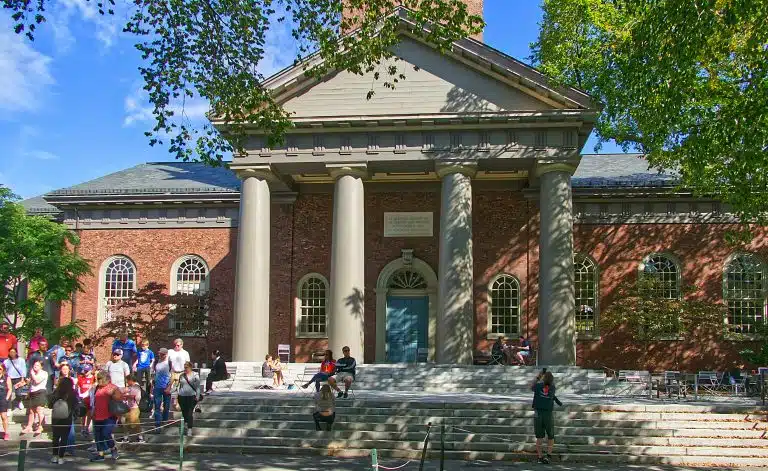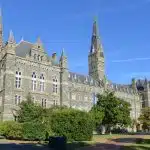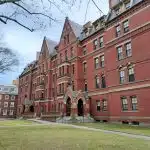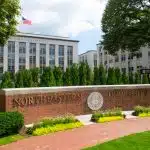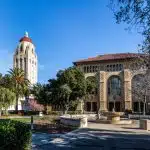If you’re thinking about going to college in Massachusetts, get excited because this state is packed with some of the most prestigious universities around. But speaking of prestige, you might be wondering: are there Ivy League schools in Massachusetts?
Whether you’re interested in STEM-focused programs or passionate about liberal arts, Massachusetts has something for every type of student. Keep reading to explore the best colleges and universities this state has to offer and find out which one could be the perfect fit for you.
- What Ivy League School Is in Massachusetts?
- Are There Other Good Colleges in Massachusetts?
- Ivy League vs. Other Top Schools in Massachusetts
- Frequently Asked Questions
- Takeaways
What Ivy League School Is in Massachusetts?
Massachusetts is home to one Ivy League school: Harvard University, right in Cambridge. Founded way back in 1636, Harvard isn’t just the oldest college in the U.S., but also the first Ivy League school.
While the term “Ivy League” originally referred to the athletic conference Harvard shared with a few other schools, it’s now more about the prestige and top-tier reputation these schools have. All of them are known for being among the best in the country, and they’re located in the Northeast and Mid-Atlantic.
Overview of Harvard University
As the oldest college in the country, Harvard University set the stage not just for the Ivy League but for pretty much every other college that came after. It started out as Harvard College in 1636, and it took some time to become the powerhouse it is today.
In the beginning, Harvard focused mostly on theology and classical studies, but by the 18th century, it started branching out with programs in law, medicine, and science.
It wasn’t until the late 1800s that Harvard really started making waves in research and technology, eventually becoming a leader in nearly every field. Today, Harvard offers top-tier programs for both undergraduates and graduates and is ranked the #1 Global University.
Harvard’s academic reputation
Harvard’s name is practically synonymous with academic excellence. With an acceptance rate of just 3.6%, it’s one of the toughest schools to get into in the country. If you want to stand out, aiming for a GPA of 4.2, an SAT score of 1580, and an ACT score of 36 is a solid starting point.
Once you’re in, you’ll quickly see why Harvard has such a strong academic reputation. The school is known for pushing students to think critically, conduct independent research, and dig deep into intellectual exploration.
Majors at Harvard
Harvard offers a broad liberal arts and sciences education for its undergraduates because the school believes in understanding the world before you change it. Here are some of the programs Harvard is most well-known for:
- #2 in Psychology
- #5 in Biocomputing/Bioinformatics/Biotechnology
- #5 in Economics
- #7 in Undergraduate Research/Creative Projects
- #17 in Most Innovative Schools
- #27 in Best Undergraduate Engineering Programs
Harvard acceptance rate
Out of 54,008 applicants for the Class of 2028, only 1,937 were admitted. That means the acceptance rate for this class was just 3.6%. That’s a pretty tough odds, showing just how competitive getting into Harvard really is. The school’s high standards are definitely still in full swing.
Here’s a closer look at how things broke down:
| Application Type | Total Applications | Accepted | Acceptance Rate |
| Regular Decision | 46,087 | 1,245 | 2.7% |
| Early Action (Restrictive Early Action) | 7,921 | 692 | 8.7% |
| Overall | 54,008 | 1,937 | 3.6% |
If you applied Regular Decision (RD), your chances were even tougher: only 2.7% of the 46,087 applicants made the cut. The Early Action (EA) folks had a bit more luck, with an 8.7% acceptance rate out of 7,921 applications. But let’s be real: even those “better” odds are still pretty competitive.
Are There Other Good Colleges in Massachusetts?
While Harvard is the Ivy League gem of Massachusetts, the state is also home to several other top-tier universities and colleges. Here’s a look at some of the other great institutions you should know about:
1. Massachusetts Institute of Technology (MIT)
- Location: Cambridge, MA
- Acceptance rate: 4.5%
MIT, located in Cambridge just a stone’s throw from Harvard, is famous for being at the cutting edge of STEM education. MIT is known for its world-changing innovations in computing, artificial intelligence, and space exploration.
MIT even helped design the Lunar Module that landed on the moon! The university’s collaborative and hands-on culture encourages students to think outside the box and solve real-world problems.
MIT is consistently ranked #2 among the best universities in the country, and that’s a reflection of its rigorous academics and groundbreaking research. If you’re exploring AI, robotics, or nanotechnology, MIT is the place to push the boundaries of what’s possible.
2. Tufts University
- Location: Medford, MA
- Acceptance rate: 11.5%
Tufts is another gem in Massachusetts. The school offers a fantastic combination of global perspective and strong academic programs. Known for its top-tier international relations and biomedical science programs, Tufts is the perfect choice for students who want to make a global impact.
Its Fletcher School of Law and Diplomacy is a leader in preparing students for international careers, and the School of Engineering is renowned for producing innovative, tech-savvy graduates.
Tufts is ranked #37 among the best universities in the nation, and its focus on interdisciplinary education, community engagement, and the arts makes it a unique place to study. Plus, being just outside of Boston gives students access to all the internship and career opportunities the city has to offer.
3. Boston College
- Location: Chestnut Hill, MA
- Acceptance rate: 15.9%
Boston College (BC) has a lot going for it: a gorgeous campus, a strong liberal arts foundation, and a focus on ethics, social justice, and leadership.
Its business school, Carroll School of Management, is highly ranked and provides a solid foundation in both business theory and practice. BC also has great programs in the humanities, sciences, and social sciences.
Tied with Tufts at the 37th spot, Boston College offers a unique combination of rigorous academics and Jesuit values, making it a perfect fit for students who want to engage with their community and the world at large.
4. Amherst College
Amherst is ranked the 2nd best liberal arts college in the U.S., and it’s known for its intimate, highly personalized education.
With an open curriculum, Amherst allows students to choose what they want to study, which promotes a unique, interdisciplinary approach to learning. The small class sizes mean that professors know their students well and are deeply invested in their success.
Amherst is a place for students who thrive in a close-knit community and want to engage deeply with their studies. If you’re looking for a school that gives you the freedom to explore a variety of subjects before focusing on one, Amherst is a great choice.
5. Wellesley College
Wellesley is one of the best women’s colleges in the country and is known for empowering women to lead in all fields. With a strong liberal arts curriculum, Wellesley offers great programs in everything from the sciences to the humanities. The college has an incredible alumni network that includes powerful women in business, politics, and the arts.
Ranked #3 among the best liberal arts colleges, Wellesley also has strong partnerships with nearby MIT, which gives students access to additional resources and opportunities. The campus itself is beautiful, with a supportive and tight-knit community that focuses on promoting personal and professional growth.
6. Boston University
- Location: Boston, MA
- Acceptance rate: 11.1%
Boston University (BU) is one of the largest and most diverse universities in the area. Known for its strong programs in business, communications, engineering, and the arts, BU offers a dynamic and global academic experience.
With a large, urban campus, BU provides access to a wealth of internship and career opportunities, especially in industries like healthcare, technology, and media. BU is ranked #41 among the best universities in the country.
7. Williams College
- Location: Williamstown, MA
- Acceptance rate: 7.5%
Williams is widely regarded as the best liberal arts college in the U.S. And if that wasn’t impressive enough, Williams also takes the #1 spot when it comes to the best value schools.
Williams also ranks #7 for undergraduate teaching, so you’ll definitely be surrounded by an academic community that encourages you to think big, explore new ideas, and stretch the limits of your intellectual curiosity.
What makes Williams really stand out is its intimate, personalized approach to education. With small class sizes and a heavy focus on undergraduate teaching, the experience here is all about close connections with professors who are genuinely invested in your success.
8. Smith College
- Location: Northampton, MA
- Acceptance rate: 21%
Smith College is another top women’s college that provides a highly rigorous academic experience. Ranked #14 among the best liberal arts colleges in the country, Smith College offers an excellent environment for women who want to develop both intellectually and personally.
Smith made history as the first women’s college in the U.S. to offer its own undergraduate degrees in engineering by launching the Picker Engineering Program in 1999. In doing so, Smith became the first all-women’s college to graduate women from an ABET-accredited engineering program—19 women to be exact, marking a major milestone for women in STEM.
With a strong alumni network and solid ties to industries like healthcare, education, and the arts, Smith College gives its graduates the connections and opportunities to make an impact in the world.
Ivy League vs. Other Top Schools in Massachusetts
When it comes to higher education, many students wonder if attending an Ivy League school is really worth the hype. Are these schools truly the best, or can other prestigious universities offer a similar—or even better—experience? Let’s break it down.
The Ivy League advantage
Ivy League schools like Harvard, Yale, and Princeton are known for their long-standing academic excellence and prestige. These schools attract top-tier faculty and provide access to unmatched resources.
When you attend an Ivy, you’re entering a network of high-achieving students and alumni who can help open doors throughout your career.
- Top-tier resources. Ivy League schools have extensive financial backing, providing state-of-the-art facilities and cutting-edge research opportunities.
- Global network. The alumni network is massive and connects you with people across industries and around the world.
- Financial aid. Despite the hefty tuition costs, Ivy League schools often offer generous financial aid packages, making them more accessible than some may think.
While these advantages are real, they’re not the only path to success.
What about non-Ivy League schools?
Non-Ivy universities like MIT, Tufts, and Boston College also offer excellent education and top-tier programs, often in more specialized fields. These schools can be a better fit depending on what you’re looking for in your college experience.
- Specialized programs. Schools like MIT have unrivaled programs in technology, engineering, and innovation. Tufts is a leader in international relations and biomedical sciences, while Boston College offers excellent business and liberal arts programs.
- Personalized experience. Smaller schools like Amherst and Wellesley provide a tight-knit community where students have more direct access to faculty and personalized mentorship.
- Collaborative environments. Many non-Ivy schools promote a less competitive, more collaborative atmosphere, which can be a great fit for students looking for a more supportive academic environment.
So, is an Ivy League education worth it? For some, it absolutely can be. The prestige, resources, and networking opportunities are hard to beat. But non-Ivy schools are by no means second-rate. Non-Ivy schools offer specialized programs, close-knit communities, and unique opportunities that can lead to just as much success.
Ultimately, it comes down to what fits your goals, interests, and the type of college experience you want.
Frequently Asked Questions
1. Is the Massachusetts Institute of Technology an Ivy League school?
No, the Massachusetts Institute of Technology (MIT) is not part of the Ivy League. While it is not an Ivy League school, MIT is one of the most prestigious and highly-ranked universities in the world, especially known for its focus on STEM and innovation.
2. Are there other Ivy League schools in Massachusetts aside from Harvard?
No, Harvard University is the only Ivy League school located in Massachusetts. It’s one of the most prestigious universities globally, but Massachusetts is home to many other top-tier universities as well.
3. What are other good colleges in Massachusetts besides Harvard?
Massachusetts is home to several good colleges outside the Ivy League. Schools like MIT, Tufts University, Boston College, and Amherst College offer world-class education and unique academic opportunities, which make them excellent alternatives to Ivy League schools.
4. What are some good liberal arts colleges in Massachusetts?
Amherst College, Smith College, and Williams College are some of the best liberal arts colleges in Massachusetts. Both offer highly personalized education and are consistently ranked among the best in the country for undergraduate teaching.
Takeaways
When it comes to Ivy League schools in Massachusetts and other good colleges, it’s all about finding the right fit for you. Here’s a quick rundown of the most important things to remember:
- Harvard is the only Ivy League school in Massachusetts. It has history, prestige, and tons of resources. If you’re looking for a powerhouse school with a global reputation, Harvard’s the place.
- There are plenty of other top schools in Massachusetts. MIT, Tufts, and Boston College are just a few of the amazing options. Each of them offers something unique, like MIT’s focus on innovation or Tufts’ strong international relations programs.
- Ivy League schools are prestigious, but non-Ivy schools can be just as excellent. Sure, Ivy League schools come with big names, but many other schools in Massachusetts have just as much to offer in terms of academics, opportunities, and community.
- Not sure which Massachusetts school is the right fit for you? A college admissions consultant can help you figure out which school aligns best with your goals and guide you through everything from essays to interviews.

Eric Eng
About the author
Eric Eng, the Founder and CEO of AdmissionSight, graduated with a BA from Princeton University and has one of the highest track records in the industry of placing students into Ivy League schools and top 10 universities. He has been featured on the US News & World Report for his insights on college admissions.

